Amid Teacher Shortage, Exceptional Educators Inspire Next Generation of New Jersey Teachers
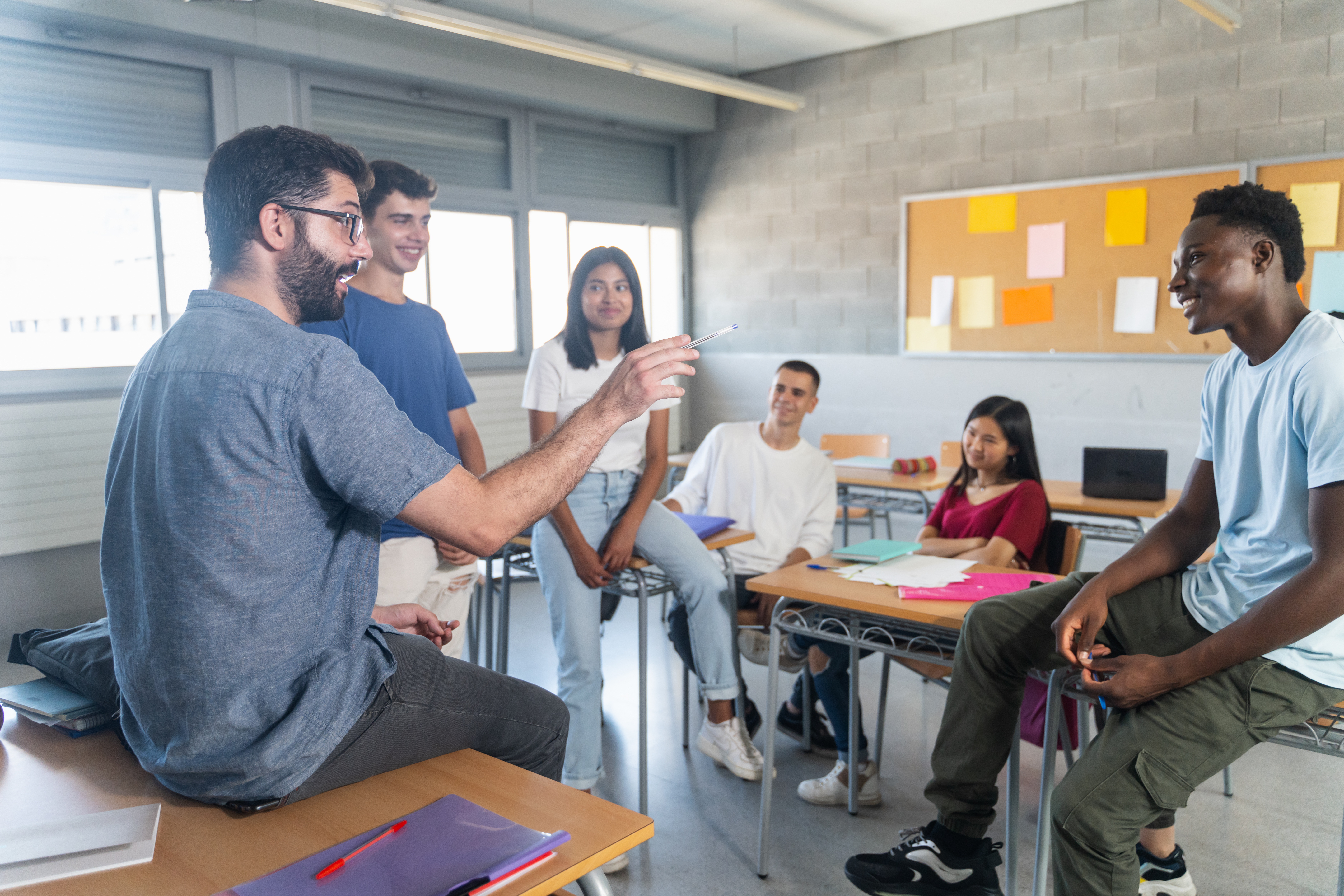
It's no secret that teachers play an essential role in shaping students' lives. That's why districts in almost every state are sounding the alarm on teacher shortages, as pre-pandemic attrition has escalated to a staffing crisis in schools.
Nationwide, around about a quarter-million teachers (233,000 teachers) left the profession between 2019 and 2021, representing a 7 percent slash to the teaching force, according to a June 2022 Government Accountability Office (GAO) report. The Bureau of Labor Statistics says that number is higher, reporting there are currently 567,000 fewer educators in America’s public schools today than there were before the pandemic. Explanations for increased resignations and early retirements range from teacher burnout and poor working conditions to insufficient pay and administrative challenges.
From the White House three-point plan and individual state initiatives, many ideas have emerged for addressing the teacher shortage. In New Jersey, lawmakers have introduced a slate of bills they believe can attract more teachers and support retention in the profession. Ideas include offering stipends to student teachers, extending student loan forgiveness for teachers, eliminating the Praxis basic skills test, and allowing retired teachers to return without risking pensions, among other solutions.
In addition to the various policy ideas, it is important to first stimulate increased interest in teaching as a profession. We can achieve this by inspiring students with memorable, life-changing learning experiences at the hands of exceptional educators. Not only do teachers nurture their students' learning journeys, but they also possess the power to leave a lasting impression that ignites a student's interest in teaching. It’s high time for the profession to leverage this.
Alternative certification candidates at Rutgers Alternate Route explored their own journeys to the teaching profession, pulling personal anecdotes from their days as students learning from teachers they consider experts and as educator rookies alongside veteran teachers. These educators demonstrated their expertise through their teaching methods, their ability to create a positive classroom environment, and their genuine care for their students' learning and growth. Discover the teaching practices of the expert educators our candidates encountered who set them on the path to teaching.
High Expectations
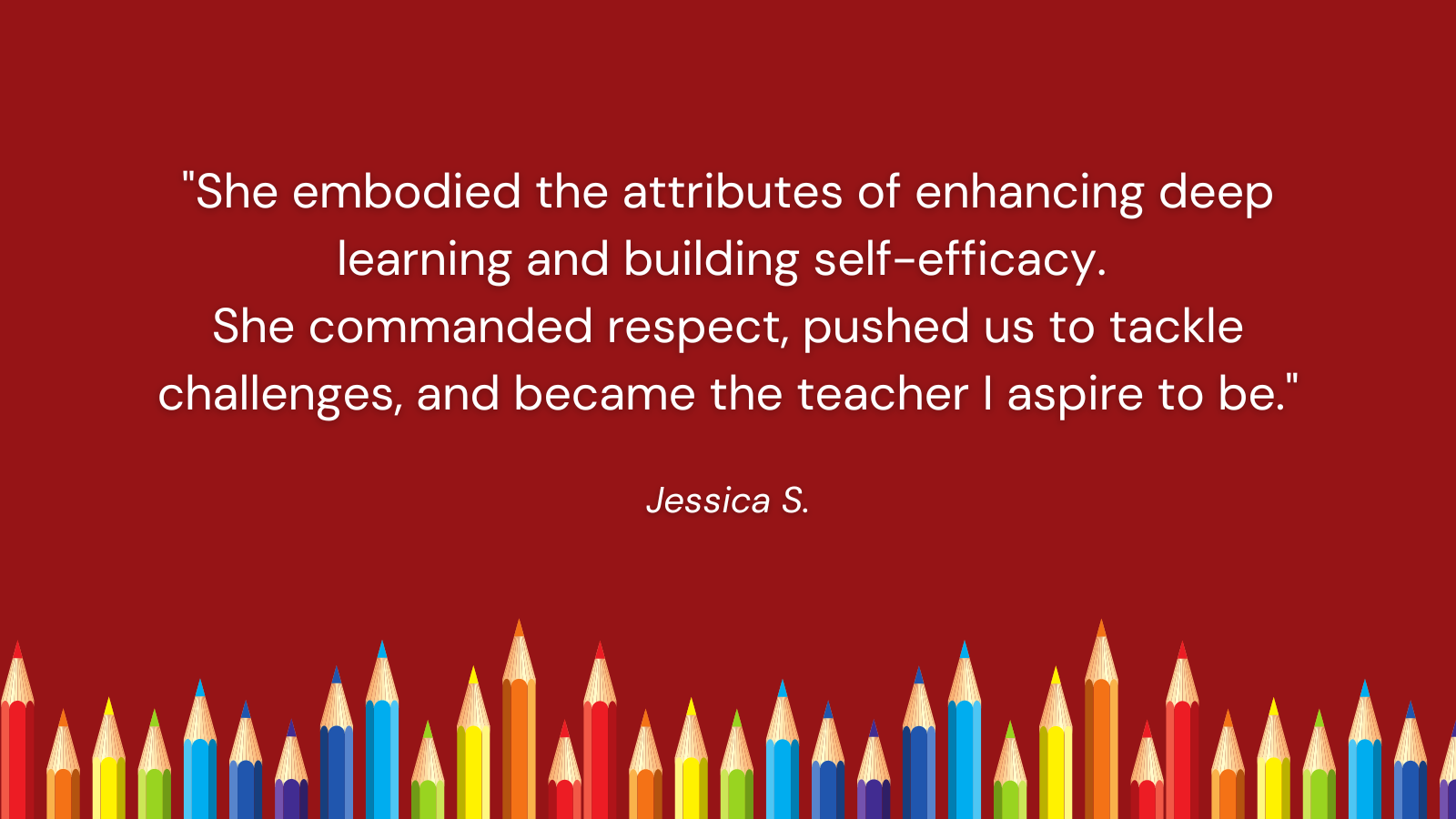
Setting high expectations for students is a core component of effective teaching. This practice establishes a consistent demand for students' best efforts, fostering continuous improvement and growth—excellence from students. When teachers hold high standards and believe in their student's abilities, it can profoundly impact their learning and help them reach their full potential. Several new teachers in our program discussed the importance of high expectations and takeaways they can reference for their professional practice.
Gabriella S. discussed the teaching practices of her co-teacher for social studies, Ms. Golumbuski, noting that she sets high expectations for her students by delivering direct and explicit lectures and clearly outlining her expectations. In addition, Ms. Golumbuski creates a positive and engaging learning environment by asking deep and thought-provoking questions, encouraging active participation from her seventh-grade students.
According to first-year teacher Devin G., his Medical Terminology Teacher, Mrs. Donahue, qualifies as an expert teacher with high expectations. He describes how she enhanced student learning by using engaging documentaries and real-life examples to teach medical terminology. In addition, she evaluated student understanding through questions, assessments, and challenging diagrams, promoting deep comprehension rather than mere memorization.
Alicia P. recalls the demanding expectations of a teacher she had as a student. She writes, "One teacher who stands out in my memory was one of the most challenging. He held exceptionally high standards and wasn't quick to hand out good grades. I devoted myself to writing, studying lecture notes, and diving into textbooks. It was a true test of determination, but when I earned good grades, I knew they were well-deserved. His engaging and diverse teaching strategies made the material more understandable, and I can't recall any classroom issues during his lessons."
Mrs. Startzel gets Jessica S.'s vote as an expert teacher. She writes,"[M]y social studies teacher and Mock Trial coach profoundly impacted me. She embodied the attributes of enhancing deep learning and building self-efficacy. She commanded respect, pushed us to tackle challenges, and became the teacher I aspire to be.
Joel C., who teaches music, believes his college math professor exemplifies expert teaching. "My college math professor was an expert teacher who facilitated challenging class discussions that required deep thinking," writes Joel. "Through differentiated instruction, he personalized the subject matter and pushed me in ways that have had a profound and lasting impact on my life, solidifying his status as an exceptional educator."
Subject Passion
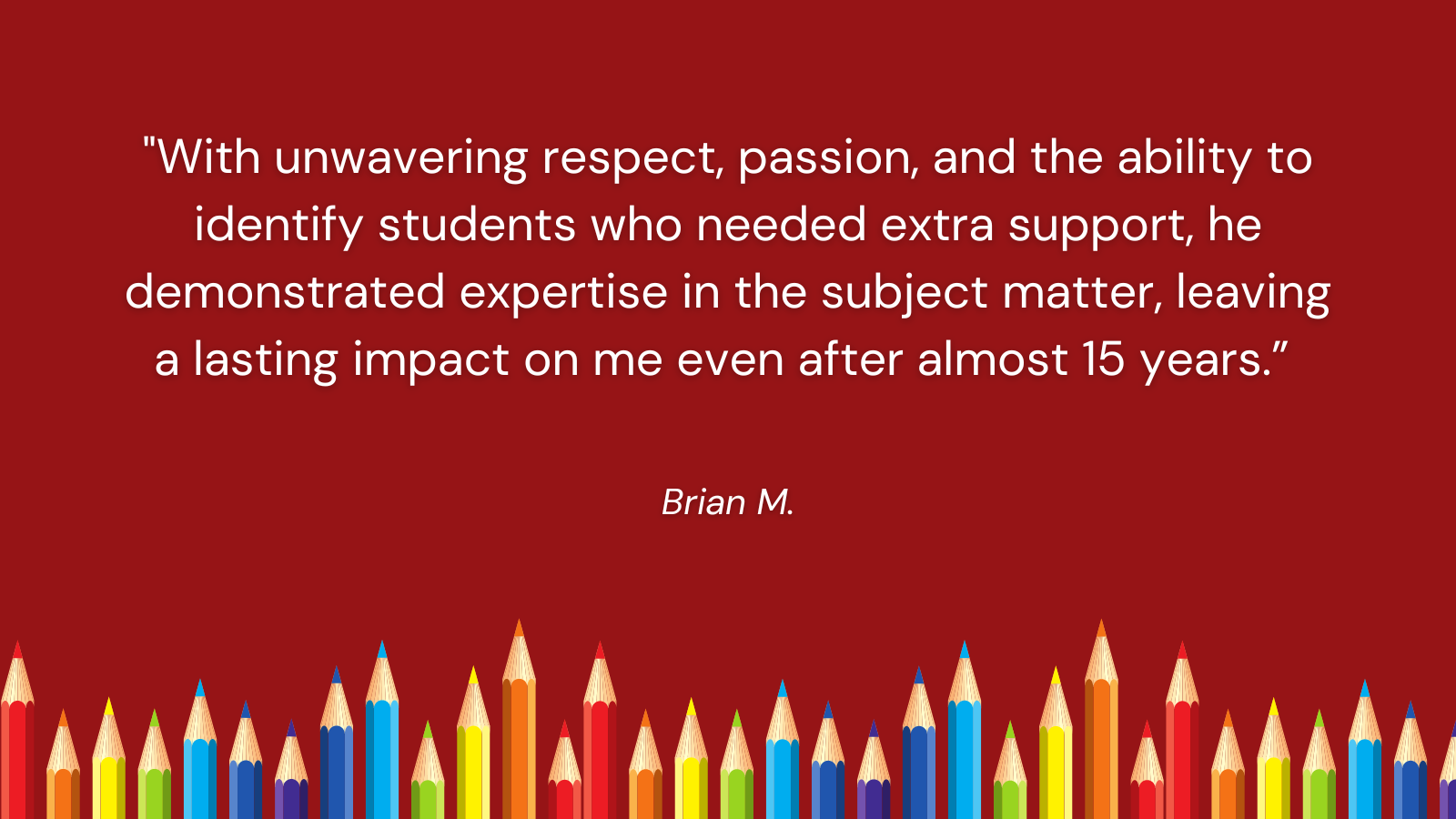
Some teachers are passionate about the activity of teaching because they enjoy working with youth and shaping the future. Others are passionate about their subject areas and are deeply stirred by issues and ideas related to their field of interest.
When subject passion drives a teacher's instruction, they help students connect with the content. Even when challenged with students who do not exhibit an interest in the subject, such teachers can help students find something about the subject that excites them. Further, they can easily incorporate life lessons into the curriculum and take education outside the classroom to help students see the bigger picture.
Connor C., who teaches high school English, credits his college professor’s passion for Iberian literature and classics, for igniting his enthusiasm for learning and achievement. He writes, “Professor Lee, my expert teacher and thesis advisor throughout my undergraduate journey, not only taught Iberian literature and classics but also excelled at connecting texts to diverse historical and modern representations, fostering a welcoming classroom environment that instilled confidence in both peer interaction and receiving affirming and constructive feedback, ultimately igniting my passion for studies and enabling me to graduate with a sense of pride for my academic achievements.”
Elementary teacher Brian M. speaks fondly of his college Civil and Revolutionary Wars instructor and how his engaging and passionate teachings later impacted his career. He says, “During my early years at Brookdale, I had an exceptional history teacher who taught classes on the Civil and Revolutionary Wars. His unique classroom setup, with chairs arranged in a U-shape against the walls and him constantly moving around, coupled with his immersive teaching style—employing accurate accents, demonstrative language, and gestures—created an engaging and realistic learning experience. With unwavering respect, passion, and the ability to identify students who needed extra support, he demonstrated expertise in the subject matter, leaving a lasting impact on me even after almost 15 years.”
Dana J. discusses a math teacher she had in seventh grade who not only presented the content effectively but also carried herself with kindness, firmness, and self-assurance. These dispositions instilled confidence in her math students while relating problems to real-life situations and providing individualized support until an understanding was achieved, resulting in a perfect balance of teacher-led and student-led classroom dynamics.
Flavia G. recalls her expert English language arts resource teacher. She describes her as highly knowledgeable and research-oriented with the ability to seamlessly integrate new subject matter with existing information, make cross-curricular connections, and customize courses to meet student needs. Additionally, Flavia continues, “She exhibits flexibility in her data-driven, individualized instruction, anticipating and resolving problems while utilizing feedback and data to inform her teaching decisions.”
Business teacher Mara P. recognizes her colleague Ms. Crowley, a world history teacher in the same high school, as an expert. Mara states, “She is an expert in her field with extensive knowledge, adaptability to student feedback, and an understanding of potential learning barriers.” According to Mara, Ms. Crowley sets appropriate goals and designs engaging activities that promote deep understanding rather than mere busy work.
Student Relationships
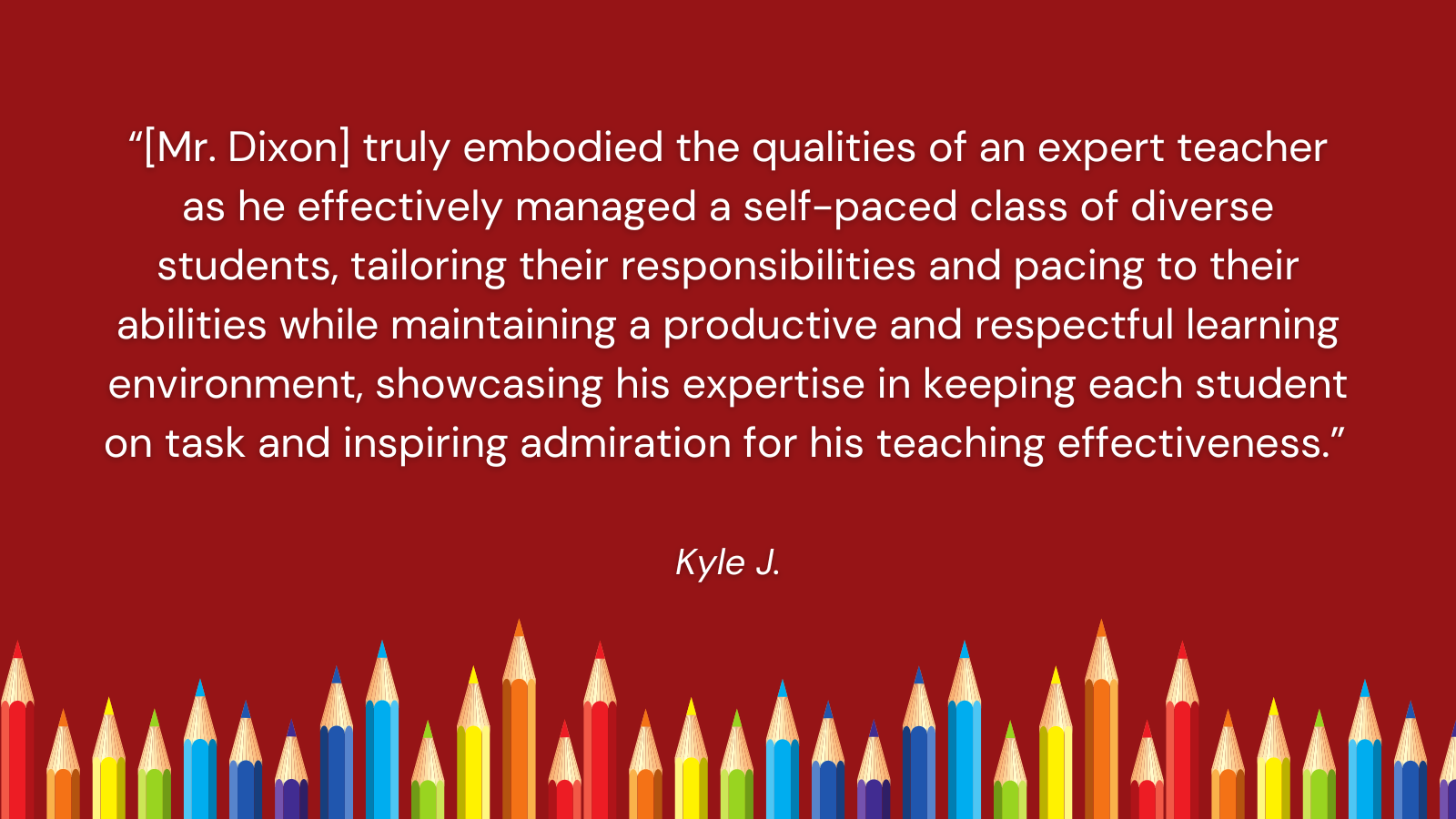
Expert teachers possess a unique ability to cultivate meaningful relationships with their students, establishing an environment that fosters growth and learning. These exceptional educators go beyond merely imparting knowledge; they connect with their students personally, nurturing their intellectual curiosity and instilling a passion for learning.
Such impactful student-teacher relationships influence the present and leave an indelible mark on the future. As aspiring teachers witness the transformative effects of these connections, they are inspired to emulate these practices, shaping their teaching approaches, and perpetuating the cycle of excellence. The teaching candidates below discuss the practices of expert teachers they’ve enjoyed as students.
Matthew A. reflects on Mr. Selover, a teacher he had in his youth, celebrating the noticeable ways the teacher established relationships with his students. “Mr. Selover, one of my teachers growing up whom I consider an expert, created an engaging learning environment by understanding our needs, being prepared yet adaptable, staying calm in complex situations, addressing individual learning requirements, and demonstrating an unwavering passion for his students and the joy of learning, leaving a lasting impression even years later.”
Grace H. remembers one of her high school teachers' caring and committed attitude. With this disposition, Grace’s teacher kept her classroom engaging and earned the respect of her students while doing so. Grace writes, “My high school teacher, whom I consider an expert, earned respect in the classroom, created an enjoyable learning environment, and demonstrated care and commitment towards students, fostering an atmosphere where potential barriers were overcome through individualized communication, challenging assignments, and promoting collaboration and peer/group discussions, resulting in engaged students and accelerated class time.”
Laura W. discusses how her college band teacher Dr. Mcarthy was an expert in building relationships with students and respecting them in every aspect. According to Laura, “Dr. Thomas McCauley earned this classification through his high respect for students and trust in their independent practice, skillfully leading rehearsals with minimal verbal communication, relying on precise expressions and gestures to convey critical information, allowing individuals to recognize mistakes without humiliation, and fostering an environment where creativity and learning from errors were embraced.”
In the eyes of Music teacher Kyle J., his high school design and technology teacher, Mr. Dixon, has the qualities of a teacher who builds excellent relationships with his students. He states, “[Mr. Dixon] truly embodied the qualities of an expert teacher as he effectively managed a self-paced class of diverse students, tailoring their responsibilities and pacing to their abilities while maintaining a productive and respectful learning environment, showcasing his expertise in keeping each student on task and inspiring admiration for his teaching effectiveness.”
Engaging Lessons
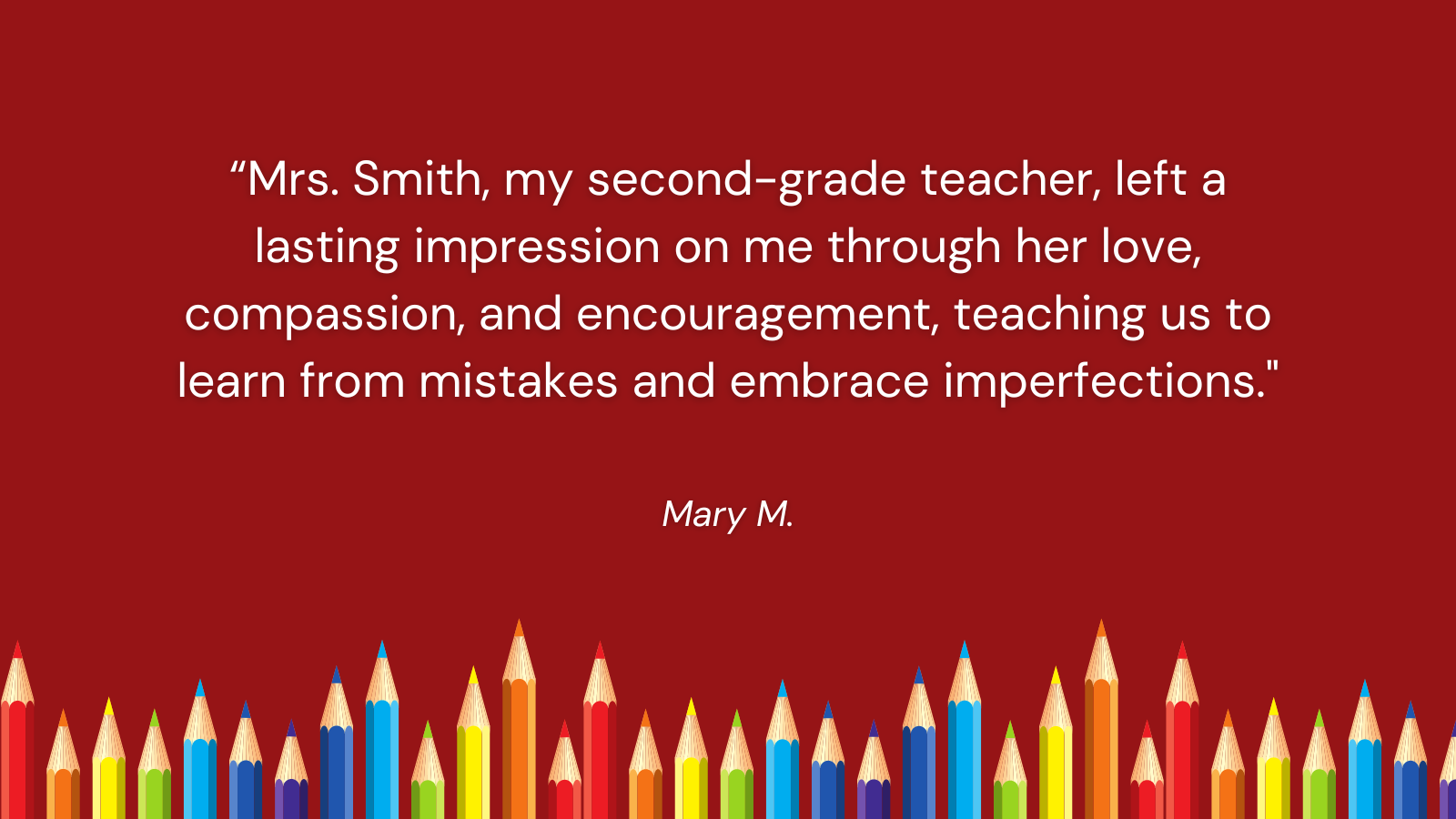
Boredom is a common challenge in schools, according to a ReserachGate study conducted in 2015. Because boredom can lead to disengagement and dropout, thereby undermining a student’s ability to reach their future potential, it is imperative that schools address this challenge.
One antidote for boredom is an engaging lesson. Engaging lessons taught by dedicated teachers profoundly impact students, shaping not only their immediate academic performance but also their long-term success and personal growth. When teachers create an environment that captivates and stimulates students' minds, they foster a love for learning, encourage critical thinking, and nurture a thirst for knowledge. Such engaging lessons go beyond the dissemination of information; they inspire curiosity, ignite passions, and instill valuable skills that extend far beyond the classroom.
Explore How to Turn Boring Lessons Into Engaging Content after exploring candidates’ observations.
Lama G. shares fond memories of her French teacher, noting her engaging lessons and effective teaching practices. Now a French teacher herself, Lama recalls, “In grade 9, I had an exceptional French teacher who was a problem-solver, fostering an optimal classroom climate for learning by providing in-depth explanations, encouraging active engagement, challenging us with thought-provoking questions, guiding our discovery of language rules, respectfully addressing our inquiries, and demonstrating genuine care and knowledge of each student.”
Anika S., who teaches elementary school, reflects on how her high school history teacher approached her lessons. She explains, “Mr. McGuire, my high school history and sociology teacher, had a profound impact on me as he shared personal insights, transformed lessons into immersive stories, demonstrated a passionate approach, and set high expectations for us, instilling in us the belief that we were all capable of success, which motivated us to excel in his class.”
Music teacher Kevin M. talks about how his orchestra teacher was an expert in engaging his students. “My high school orchestra teacher, Mr. Enz exemplified an expert teacher in various ways,” explains Kevin. He recalls Mr. Enz’s, “deep understanding of the subject matter, ability to adapt to classroom situations, personalized learning interactions, exceptional monitoring and feedback, instilling a sense of purpose, and facilitating expert levels of surface and deep learning.”
Mary M. remembers how her second-grade teacher’s engaging lessons and passion for her students impacted her and stuck with her for many years. “Mrs. Smith, my second-grade teacher, left a lasting impression on me through her love, compassion, and encouragement, teaching us to learn from mistakes and embrace imperfections,” she reflects. Mary’s teacher achieved this, “while making learning exciting and enjoyable through hands-on activities, group work, and challenging assignments that pushed us beyond our comfort zones, all while effortlessly maintaining structure and respect in her classroom, making her an excellent and expert teacher who I am grateful to have had in my early years of education.”
Managing Behavior
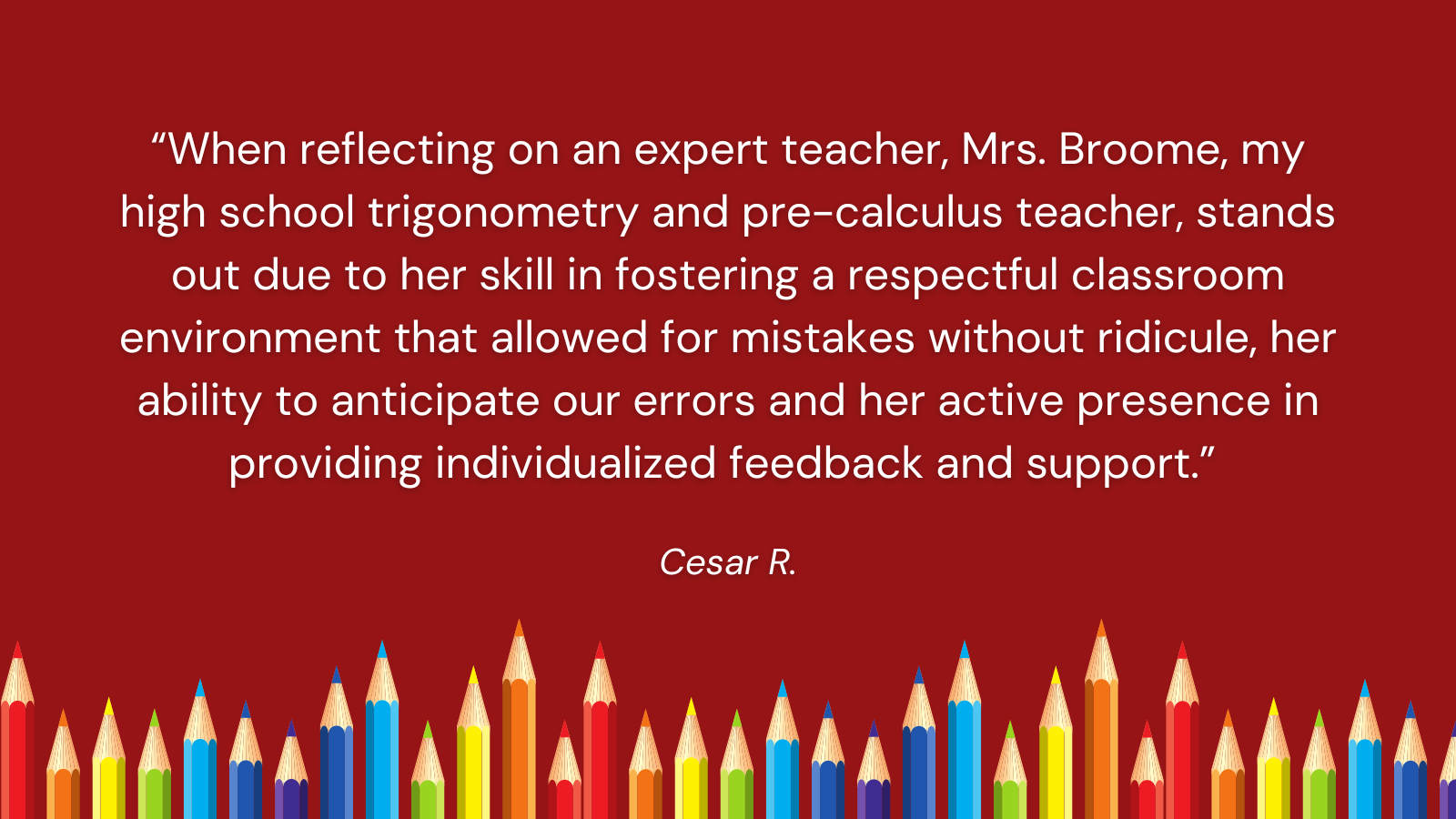
Effective teaching goes beyond imparting knowledge and delivering lessons; it encompasses the important skill of managing behavior in the classroom. A teacher who masters the art of behavior management becomes an expert in creating a learning environment that fosters positive student character and is conducive for risk-taking and academic growth.
By establishing clear expectations, implementing consistent discipline, and promoting positive reinforcement, an expert teacher can help students build social-emotional learning skills such as self-management, resilience, and interpersonal skills, among others. This skillful behavior management enhances classroom dynamics and equips students with valuable pro-social tools for navigating challenges, collaborating with others, and increasing future success.
Katherine D., who teaches in a pre-K/ kindergarten class, talked about her lead teacher, who she recognizes as an expert teacher with an adeptness for managing student behavior. “My lead teacher, Kim, in my current special education self-contained pre-K/kindergarten class, is an expert teacher with extensive experience, excellent communication skills, and the ability to anticipate and address student behavior,” writes Katherine. She further describes her as “a sought-after resource for guidance, making her a fantastic role model for me to emulate in meeting the unique needs and capabilities of our students.”
The teacher Luke S. recognizes as an expert is Ms. Silverman, whom he describes as “an intelligent and respected teacher, [who] effortlessly commanded the classroom and conveyed the curriculum with casual ease.” In addition, Luke writes, Ms. Silverman achieved this “while challenging her students and providing tailored guidance based on individual needs, inspiring a transformative shift in approach and leading to improved academic performance and personalized support for each student.”
Cesar R. reflects on how his high school pre-calculus teacher Mrs. Broome made her classroom a safe place for all learners. Cesar writes, “When reflecting on an expert teacher, Mrs. Broome, my high school trigonometry and pre-calculus teacher, stands out due to her skill in fostering a respectful classroom environment that allowed for mistakes without ridicule, her ability to anticipate our errors and her active presence in providing individualized feedback and support.”
According to kindergarten teacher Theresa E., one of her recent teaching colleagues demonstrates superior behavior management methods. “The kindergarten teacher I worked with displayed exceptional attributes as she mastered organization, preparedness, creating a safe and positive learning environment,” recalls Theresa. Also admirable is the teacher’s ability for “posing challenging questions to foster growth, and consistently problem-solving and anticipating potential classroom situations, providing…a valuable opportunity to learn from her teaching methods.”
Expert teachers possess the power to transform lives and shape futures. The reflections shared in this blog post highlight the remarkable impact of educators who set high expectations, build strong relationships with their students, and display their passion for teaching.
As exceptional teachers, they leave an indelible mark on their students, nurturing their intellectual growth, instilling a lifelong love of learning, and influencing the direction of career choices. Many of the contributed teachers have embraced teaching thanks to a teacher who inspired them to do so. We are excited to celebrate and honor the dedication and expertise of these educators who have gone above and beyond to shape the minds and hearts of the next generation while stimulating the pipeline of new teachers.
If you’re considering following your dream of teaching, Rutgers Alternate Route can offer you the support and training you need to succeed. Be sure to follow Rutgers Alternate Route on Twitter or sign up for Alternate Route’s monthly newsletter for more information and stories from the field of education.

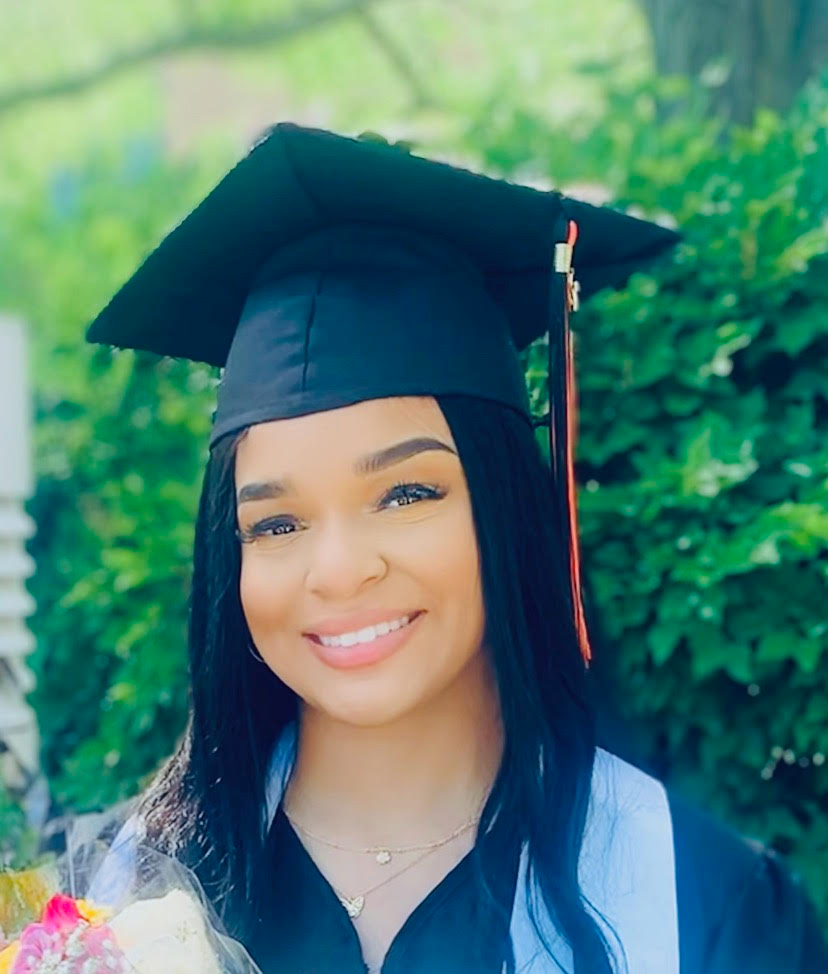 DeMariah Woodard is an undergraduate student at Niagara University where she is a double major in Psychology and Criminal Justice. She supports content creation initiatives with Black Star Communications as a Digital Communications Intern for Summer 2023. Published works by DeMariah are completed in collaboration with the Rutgers Alternate Route Team and Black Star Communications.
DeMariah Woodard is an undergraduate student at Niagara University where she is a double major in Psychology and Criminal Justice. She supports content creation initiatives with Black Star Communications as a Digital Communications Intern for Summer 2023. Published works by DeMariah are completed in collaboration with the Rutgers Alternate Route Team and Black Star Communications.





